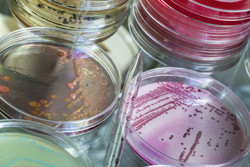Global network for microbial resource centres
There are around 200 collections of microbes in Europe and development of quality assurance and technical expertise is key to delivery of optimal microbial resources and services. Ten partners from seven countries have worked together to form the EMBARC(opens in new window) (European consortium for microbial resource centres) project to address this ambitious goal. EMBARC's deliverables include a common quality manual to enable collection operators to identify and move towards the implementation of best practices. Consortium members have also improved protocols to identify, authenticate and preserve cultures. Working with scientists and journal editors, the improvement of access to strains cited in publications was also addressed. Safe handling of microorganisms is a top priority and the project consortium worked with the microbiology community to develop a Biosecurity Code of Conduct. After analysis of factors impacting handling, storage and distribution of microbial strains, appropriate mechanisms have been drawn up to safeguard the public and environment against misuse of microorganisms. A one-stop access to the member collections of EMBARC and the wider European BRC community via a searchable web portal building on the outcomes of Common Access to Biological Resources and Information and Global Biological Resource Centre Network was initiated. At the molecular research level, the project created a European Microbial DNA Bank Network(opens in new window) with shared roles and common practices. Dissemination efforts have highlighted the major outcomes of the EMBARC deliverables widely; these included a success stories brochure and papers and posters at 41 conferences in 10 countries. Thirty publications cover protocols to extend the shelf life of delicate microbes and molecular marker-based identification schemes. Interaction opportunities between mBRCs, microbiology laboratories and the bioeconomy have been increased by training initiatives including a new Erasmus Mundus Programme and new e-learning tools. A programme for transnational access to mBRCs was offered to almost 60 European scientists across 10 countries for 580 days. EMBARC played a key role in placing the Microbial Resource Research Infrastructure on the European Strategy Forum for Research Infrastructures roadmap (2010). Harmonisation and a common approach to developing such an infrastructure have laid the foundations for a global BRC network.







